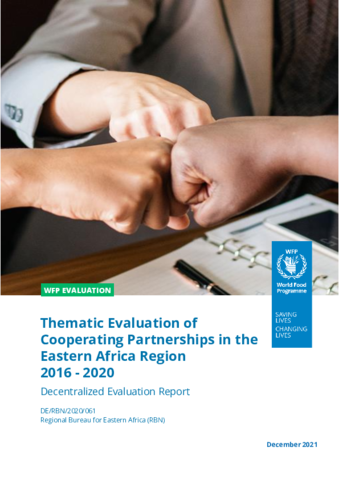
The objectives of the evaluation include both accountability and learning, with an emphasis on learning. This evaluation was commissioned to inform WFP’s regional cooperating partnership strategy to meet its localization and Grand Bargain commitments; develop a better understanding of cooperating partnerships (CPs) across the region; enable RBN to initiate a strategic dialogue around cooperating partnerships with country offices (COs) during second-generation Country Strategic Plan (CSP) design; and inform RBN’s gender-transformative approach to cooperating partnerships.
Overarching evaluation questions focused on: (i) How relevant are WFP cooperating partners and partnership management practices in countries supported by RBN?; (ii) To what extent have (a) CO partnership management practices and (b) partners’ capacities and performance been strengthened? and; (iii) What internal and external factors have influenced (a) CO partnership management practices and (b) partners’ capacities and performance?
The evaluation covered cooperating partnerships management.
Key evaluation findings included:
- The evaluation found that by increasing standardization and placing greater emphasis on efficiency, WFP has improved some elements of CP management, especially related to risk management.
- WFP has begun to shift away from seeing CPs as delivery agents/contractors towards seeing them as partners in country-level strategic planning to achieve Zero Hunger. However, CP management practices and tools still lag behind the strategic thinking about cooperating partnerships.
- WFP has not had a clear approach to strengthening the capacity of CPs. The new generation of CSPs provides an opportunity to clarify this approach and its linkages to country capacity strengthening efforts.
- WFP has made progress on Grand Bargain commitments overall, but has not yet clarified the implications of the localization agenda for cooperating partnerships and CP management in each country office.
- There is still unmet potential to link CP management with WFP’s more gender-transformative agenda, and current partnership management practices and tools do not encourage CPs to go beyond a focus on “numeric” gender equality towards more gender-transformative programming.
Key recommendations from the evaluation included:
- WFP should develop a strategy that contains an intentional approach to how WFP will meet its commitments to the localization agenda in the Eastern Africa region.
- WFP should articulate a more intentional approach to drawing on CP management as a strategy for increasing capacity for gender-transformative programming.
- WFP should continue to harmonize partnership management processes with other UN agencies and pursue strategic collaboration with other organizations aimed at capacity strengthening of CPs.
- WFP should institutionalize partnership management, including CP management, as a field of technical expertise that encompasses oversight on transactions of cooperating partnerships and strategic aspects of CP management.
- WFP should continue ongoing efforts to increase the digitization and automation of CP management processes at COs and Field Offices in the region.
